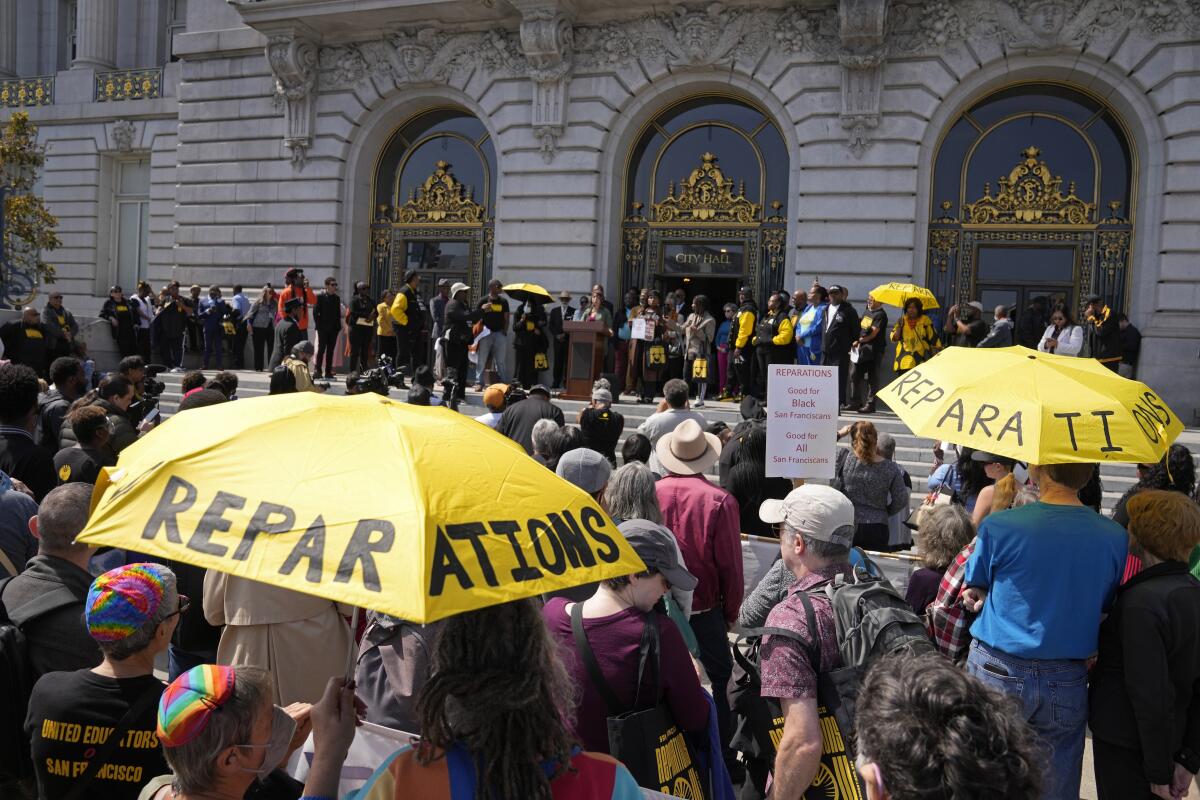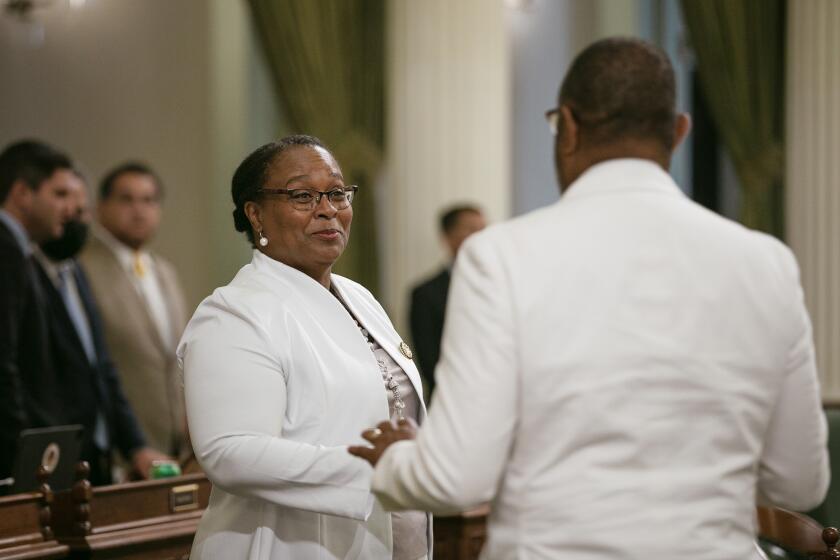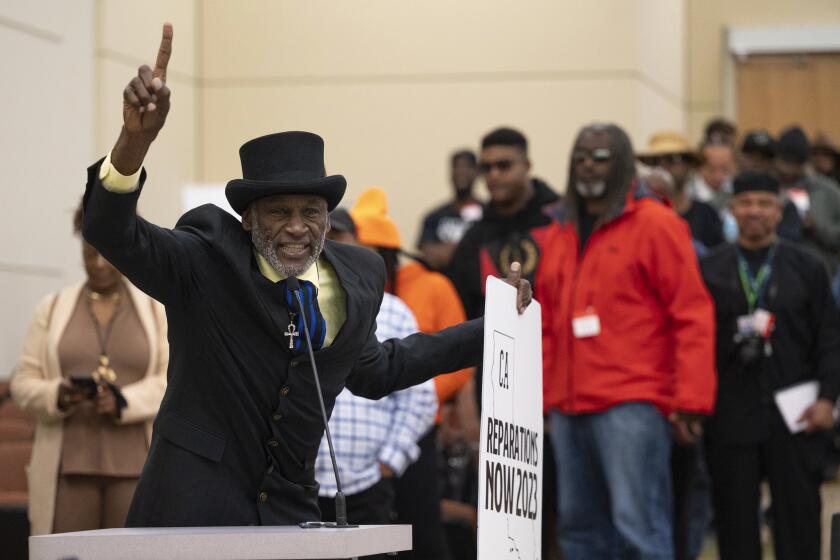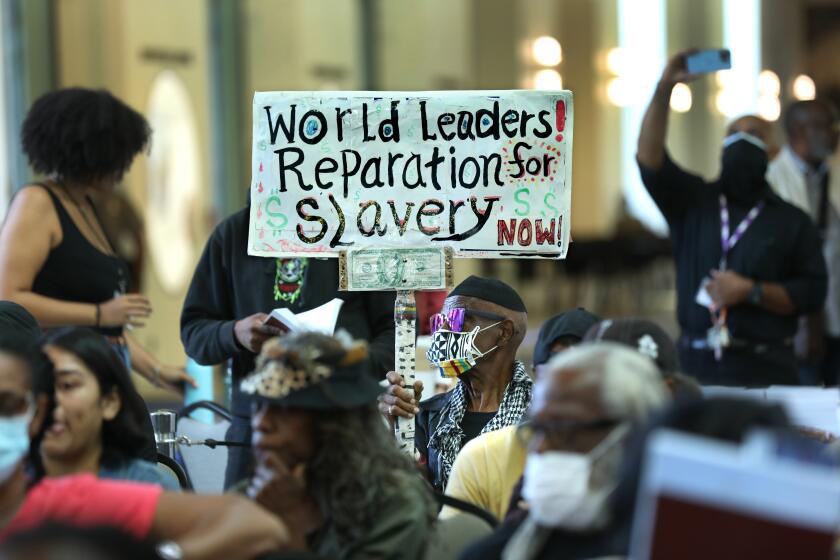Column: California finally has a reparations plan. Why is it half-baked and disorganized?

On Thursday morning, state Sen. Steven Bradford sat down alone at a table inside the Capitol in Sacramento.
He fiddled with a stack of papers while waiting for reporters in the room to quiet down and then, with self-assured gravitas, announced a detailed plan for legislation that would provide reparations for Black Californians.
“Several months ago, I began the work of developing this package,” Bradford said. “These policies have an impact that’s needed right now to start to repair some of the harms that were defined.”
One could be forgiven for thinking that the Gardena Democrat was about to explain California’s long-awaited legislative strategy for compensating Black people for the lasting harms of slavery and systemic racism. A strategy that supposedly has been in the works since the state-appointed reparations task force, of which the senator was a member, ended its work in June with a long list of recommendations for the Legislature and Gov. Gavin Newsom.
But Bradford wasn’t explaining that.
The California Legislative Black Caucus released a list of 14 bills as a first set of reparations for the descendants of African Americans who were enslaved.
That’s because California doesn’t really have a legislative strategy for reparations. Not one that is a cohesive vision anyway.
Instead, what we have so far is a confusing and growing collection of bills — some of them half-baked and all of them introduced by lawmakers who, despite their assertions to the contrary, don’t seem to be on the same page about what to prioritize or how to move forward.
The ramifications of this are profound and a little embarrassing, especially for a state where officials regularly proclaim they want to lead the nation with a multiyear reparations campaign.
Sure, some of what is happening is just because of the normal way the legislative process works in Sacramento. Lawmakers often cooperate with one another, but also are free to go rogue.
“Each individual member is duly elected on their own and has a constitutional right to be able to submit whatever bills they think are appropriate,” said Assemblymember Lori D. Wilson, a Democrat from Suisun City who is chair of the California Legislative Black Caucus. “And so we as a caucus would never ever interfere.”
But reparations isn’t a normal issue. It’s one of the most important, most transformational policy frameworks for Black Americans in generations. It’s also controversial, difficult to define and a magnet for misinformation, and so even the appearance of infighting and disorganization among supporters could easily doom it.
Already polls consistently show that the idea of compensating the descendants of people who were enslaved is unpopular with most voters. And I suspect it’s particularly unpopular this year, given the state’s yawning budget deficit.
So if officials in other states, including New York with its own newly approved task force, are looking to California to lead, they probably have the same question I do: What hope is there for getting more people united behind a vision for enshrining reparations into law when the very people pushing the legislation don’t even seem to be united?
In a new report, California’s reparations task force calculates how much Black people are owed for racism. It’s at least hundreds of millions of dollars.
Consider that just 24 hours before Bradford sat down in that room at the Capitol, the Legislative Black Caucus — of which the senator is a member — quietly announced a sweeping 2024 Reparations Priority Bill Package.
The 14 bills included in it are separate from what Bradford introduced, except for one that calls for restitution for the racist seizures of property (see: Bruce’s Beach or Section 14 in Palm Springs). What’s more, a number of the bills seem well-intended, but are head-scratchers.
Like the forthcoming bill from Assemblymember Kevin McCarty (D-Sacramento) for “career education financial aid for redlined communities.”
Or one from Assemblymember Corey Jackson (D-Perris) that would amend “the California Constitution to allow the state to fund programs for the purpose of increasing the life expectancy of, improving educational outcomes for, or lifting out of poverty specific groups.”
Or even one from Sen. Lola Smallwood-Cuevas (D-Los Angeles) that would “address food injustice by requiring advance notification to community stakeholders prior to the closure of a grocery store in underserved or at-risk communities.”
Thankfully, the bill in the caucus’ package that’s likely to get the most attention makes perfect sense. It’s from Assemblymember Reggie Jones-Sawyer (D-Los Angeles) and will demand a formal apology from the governor and the Legislature for the role California played in the atrocities against Black people who were enslaved and their descendants.
“We’re even thinking about how do we make sure it’s displayed,” he told me, “so that people can see that the apology is not just something that’s written on some piece of paper.”
Although that bill is still being written, it’s likely to be introduced this month and will complement a resolution from Assemblymember Akilah Weber (D-La Mesa) that explains exactly what those atrocities are and why California is culpable.
All told, the number of reparations bills could eventually number in the 30s, and presumably run the gamut on priorities. The caucus, Wilson told me, merely decided on the 14 that they could agree to support collectively.
State Sen. Steven Bradford wants to give Black people closed prisons in rural towns. It’s exactly the sort of weird plan that might move a wary Legislature.
“This is a similar process that we do every single day,” she told me. “We have a number of bills that we believe, as caucus members, impact California. And so we come together and figure out which ones are going to be our absolute priority.”
Still, it’s hard to dismiss the confusion that has accompanied this week’s announcements — timed, I’m told, to meet the artificial deadline of the start of Black History Month, as if there weren’t 29 days in February.
Bradford, at his news conference on Thursday, was forced to answer questions about why he wasn’t on the call when the rest of the caucus announced its bill package, and about whether members are in agreement about a legislative strategy for reparations.
“I wouldn’t say we’re divided,” he repeatedly told reporters.
Jones-Sawyer echoed Bradford, assuring me, “We’re all unified behind getting something done. That is not the issue. The issue is what do you push out first?”
“But this,” he added, referring to all the questions and confusion, “is exactly why we’re hiring a marketing firm.”
It certainly can’t hurt.
More to Read
Sign up for Essential California
The most important California stories and recommendations in your inbox every morning.
You may occasionally receive promotional content from the Los Angeles Times.














